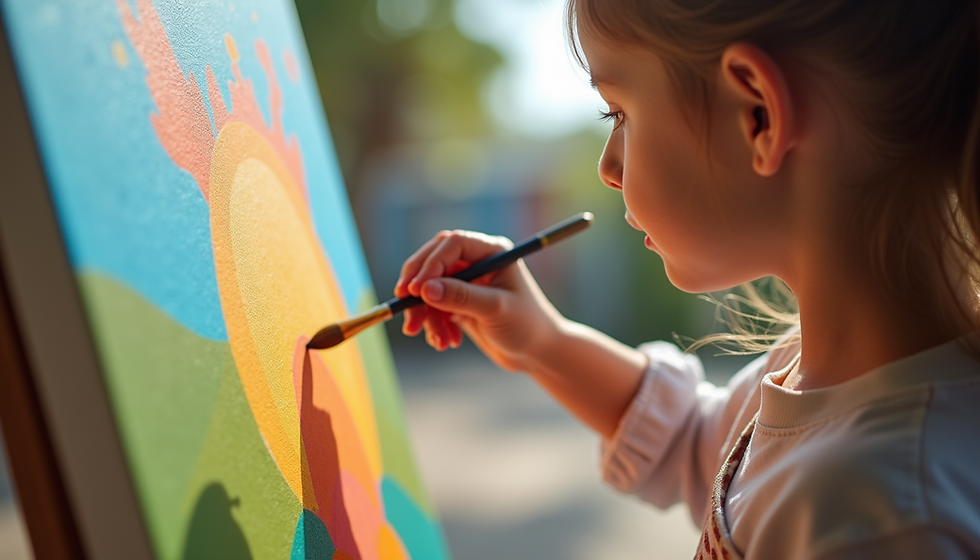How Creative Camps Inspire Young Minds
- Rebecca j. Hopp
- Jun 7, 2025
- 4 min read
Creative camps provide a unique opportunity for children and teenagers to explore their imagination, develop new skills, and form lasting friendships. These immersive experiences are designed to foster creativity, critical thinking, and personal growth. As our world becomes increasingly technology-driven, the encouragement of creative expression remains more important than ever. This blog post explores how creative camps can inspire young minds and why they are an essential component of childhood development.
Exploring Creative Camps
Creative camps come in various forms, each aimed at stimulating the minds of young participants. These camps often focus on arts and crafts, theater, music, literature, and other creative pursuits. By attending creative camps, children are exposed to an array of activities where they can express themselves freely.
For instance, art camps can provide structured opportunities where children can engage with different mediums, ranging from painting to sculpture. This structure helps kids discover their passions while learning valuable skills. Furthermore, creative camps often employ experienced instructors who encourage experimentation, reinforcing the idea that failure is part of the learning process.

The Benefits of Creative Engagement
Participating in creative camps has profound benefits for children's mental and emotional well-being. According to research by the National Endowment for the Arts, engagement in artistic activities contributes to higher levels of self-esteem in children. As kids create and see the fruits of their labor, they build confidence in their abilities.
Moreover, creative camps encourage teamwork and collaboration. Many activities require groups to work together to achieve a common goal. Whether through theater improvisation or group art projects, children learn to communicate effectively and respect diverse perspectives. These skills are not only essential in creative settings but also hold valuable life lessons for the future.

Fostering Innovation and Problem Solving
At creative camps, young minds are often presented with challenges that stimulate critical thinking and innovative problem-solving. Activities such as engineering design challenges, puppet-making, or even storytelling require campers to think outside the box.
For example, in a camp focused on creative writing, children might be tasked with crafting a short story using a random selection of words. This exercise not only sparks their imagination but also hones their ability to process information and refine their ideas.
Creativity in early years translates into improved problem-solving skills in adulthood. By nurturing creativity early on, these camps play a crucial role in shaping future innovators and leaders.
Building Lasting Friendships and Networking
Despite the focus on creativity, one of the most valuable aspects of creative camps is the social connections that develop among participants. Young people often find a sense of belonging within these environments, fostering friendships based on shared interests and passions.
The collaborative nature of many camp activities encourages campers to bond over shared challenges, be it in painting, musical performances, or theater productions. These connections can lead to lasting friendships that span beyond the camp experience, as participants often stay in touch and collaborate on projects even after the camp ends.
Additionally, creative camps provide networking opportunities, which can be vital for a child’s future. Meeting peers who share similar creative interests can spark collaboration and friendship that may have lasting impacts throughout their lives.
Encouraging Lifelong Learning
The arts are a powerful domain of learning and expression. By participating in creative camps, children are encouraged to view learning as a fun and dynamic process rather than a series of obligations. This perspective shifts their understanding of education, illustrating that learning can take place beyond the traditional classroom environment.
Through artistic exploration, kids learn to value individuality and appreciate the diverse range of creative expressions found in society. Their experiences at creative camps help instill a love for learning that transcends age, inspiring them to pursue new hobbies or academic interests throughout their lives.
As children gain new skills in areas such as writing, performing, or crafting, they are also introduced to the concept of lifelong learning. They learn that the pursuit of knowledge doesn't end with formal education; it is a continuous journey that can be enriched through creative exploration.
Inspiring the Future
Creative camps are instrumental in shaping the next generation. They not only equip children with practical skills but also enhance their emotional and social development. By fostering creativity, these camps prepare young minds to tackle challenges that require innovative solutions.
Parents and guardians can play an essential role in identifying suitable creative camps for their children. Researching and choosing the right environment, such as art camps, can have a tremendous effect on a child's development. Encouraging participation in creative camps can help unlock their potential, allowing them to become more confident, innovative, and well-rounded individuals.
In embracing the values of creativity and collaboration, we lay the foundation for a better, brighter future. Creative camps not only inspire the minds of children but also contribute positively to society by fostering a generation of critical thinkers, innovative problem-solvers, and compassionate individuals. So, let’s continue to support and promote these opportunities for our youth.




Comments